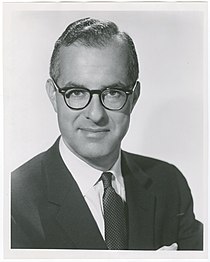Stanley Mosk
| Stanley Mosk | |
|---|---|

Mosk as Attorney General in 1960
|
|
| Associate Justice of the California Supreme Court | |
|
In office September 1, 1964 – June 19, 2001 |
|
| Appointed by | Pat Brown |
| Preceded by | Roger J. Traynor |
| Succeeded by | Carlos R. Moreno |
| Attorney General of California | |
|
In office 1959–1964 |
|
| Preceded by | Pat Brown |
| Succeeded by | Thomas C. Lynch |
| Personal details | |
| Born | September 4, 1912 San Antonio, Texas |
| Died | June 19, 2001 (aged 88) San Francisco, California |
| Religion | Reform Judaism |
Stanley Mosk (September 4, 1912 – June 19, 2001) was an Associate Justice of the California Supreme Court for 37 years (1964–2001), and holds the record for the longest-serving justice on that court. Before sitting on the Supreme Court, he served as Attorney General of California and as a trial court judge, among other governmental positions. Mosk was the last Justice of the California Supreme Court to have served in non-judicial elected office prior to his appointment to the bench. The Los Angeles County Courthouse is named after him.
Mosk was born in San Antonio, Texas, but his parents moved when he was three years old, and he grew up in Rockford, Illinois. His parents, Paul and Minna, were Reform Jews (of Hungarian and German origin, respectively) who did not believe in strict religious observances. Since Rockford sits next to the Wisconsin border, Mosk's parents followed Wisconsin politics and were strong supporters of Progressive Wisconsin Senator Robert M. La Follette, Sr. Mosk graduated from the University of Chicago in 1933 with a bachelor's degree in philosophy.
Mosk's life was strongly affected by the Great Depression. Because his father's business in Rockford was floundering, his parents and brother relocated to Los Angeles, and Mosk ended up following them after graduating from college, as they could not afford to support him for any further studies in Chicago. At the time, it was still possible to use the last year of a bachelor's degree as the first year of a three-year law degree program, so while living with his parents, Mosk was able to obtain a law degree in only two years. He earned a LL.B from Southwestern University School of Law in 1935 and was admitted to the bar that same year. Thanks to the Depression, none of the major L.A. firms were hiring; Mosk opened his own solo practice and shared an office with four other solos, each of whom maintained separate practices. During those difficult years, Mosk was a general practitioner who took whatever walked in the door.
...
Wikipedia
